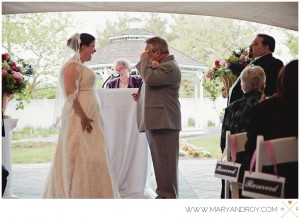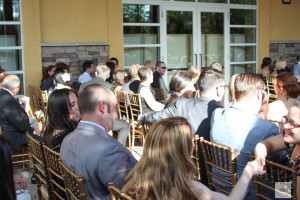Having a certified Life-Cycle Celebrant® conduct your marriage ceremony can make a lasting impression on your life together, your family, and your guests. You may wonder, “What is a Life-Cycle Celebrant and why should I consider using one?”
What’s the difference between a certified Life-Cycle Celebrant and other officiants?
First, let me talk about celebrants. Specifically, I am a Life-Cycle Celebrant, which means I’m a graduate of the Celebrant Foundation and Institute and trained in the art of creating personalized ceremonies. Only graduates of the Celebrant Foundation and Institute can call themselves Life-Cycle Celebrants. Also, I’m an instructor with the Celebrant Institute, which is great.
The reason I make that clarification is because there are a few other bodies that certify celebrants through different training programs, but I can only attest to the quality and the depth of the training that Life-Cycle Celebrants like myself go through. Our training is an intense graduate-level, seven-month course. In fact, I’m a Master Life-Cycle Celebrant, one of only a few people with title, and I’ve received advanced training in the creation of personalized ceremony.
As somebody who teaches the course, I can tell you that I have had people in my class with a Ph.D. who say that this is high-level stuff. They’re really impressed with the quality of the education.
There’s a lot that goes into what a certified Life-Cycle Celebrant specifically gets as far as training.
- We’re trained in the art, creation, and meaning of ceremony and ritual. We understand all of the little bits and pieces that make ritual effective.
- We learn how to make it personal. We know how to really think about what’s appropriate and what’s not appropriate. Also, we learn how we can shape or mold elements to make them personal, giving clients everything they want to have within their ceremony.
 A traditional “Passing the Peace” ritual is adapted
A traditional “Passing the Peace” ritual is adapted
into a “Guest Greeting” so that everyone may witness
Chris and Brittany’s wedding as friends.
- Finally, certified Life-Cycle Celebrants have all promised to adhere to a strict code of ethics. I think that that code of ethics really makes us stand out among other officiants, because it really means that our clients are not only getting the benefit of our training and experience, but they’re also getting our commitment to handle their ceremony in a very specific, inclusive, and respectful way.
What’s the difference between a certified celebrant and a justice of the peace?
A justice of the peace is going to be a civil servant who is endowed, in whatever their locality, to legally officiate weddings. In addition to my credentials as a Master Life-Cycle Celebrant, I’ve also gotten ordained through the Universal Brotherhood Movement. It is by ordination at this point that allows me to perform weddings in New Jersey and New York.
What can I expect when I hire you as a my celebrant?
The first thing you can expect is that my first goal is to make sure that you have the ceremony that you want. Often, that starts even before you’ve hired me, and it may extend to me referring you to someone else, if I think that they are a better match for you.
If, for example, you want a bilingual ceremony, I’m limited in what I can do. I can incorporate elements in other languages into the ceremony, but I only speak English. If you want a ceremony in Spanish and that’s very important to you, then I will refer you to another Life-Cycle Celebrant who is able to give you a ceremony in Spanish, because my first goal is to make sure that you have the ceremony that you want.
Once you’ve hired me, that continues. I will do research for you. I will create elements from scratch for you. I will adapt traditional elements for you. I will look for readings and I will make suggestions as to how things will work best when you come to me with an idea. Everything that I do is about giving you the ceremony that meets your needs and your wishes.
Contact me today about how I can make your ceremony a wonderful experience.

